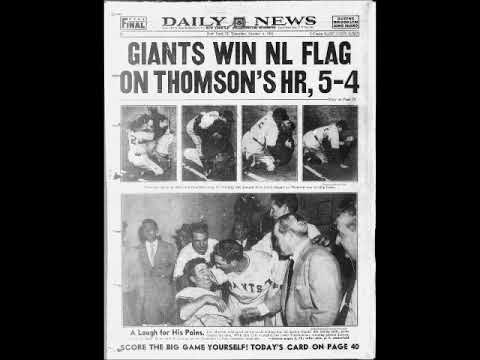The Liberty Game Of The Day
Back in the late 1940s, most of the United States was out of the reach of Major League Baseball radio stations.
Of course, that meant there was opportunity out there for anybody crazy enough to think of a way to get baseball broadcasts to the masses.
Gordon McLendon fit the bill. He founded what he called the Liberty Radio Network, which provided daily Major League Baseball broadcasts between somewhere around 1948 and the collapse of his network in May 1952.
Now, most of McLendon’s broadcasts were actually recreations of games, not live broadcasts. McLendon was skilled and capable, however, and was good at figuring out ways to disguise the fact that he was not actually at the stadium.
If you’ve ever listened to the original version of the 1951 Giants - Dodgers 3rd playoff game, you’ve listened to McLendon. There was actually some academic speculation for years that this game was also a recreation. However, the truth is that it was a live broadcast.
In fact, if you listen closely to the high quality version of the end of the game (starting with the bottom of the 8th) on Eric Paddon’s YouTube channel, you’ll know for certain that it was no recreation:
You can clearly hear the stadium noise behind him, including stadium announcements. It’s absolutely clear that this was a live broadcast. And McLendon does an amazing job given the pressure and the circumstances, even though the call of the home run itself is not necessarily the most famous. The overall description job McLendon does is simply amazing.
This copy, by the way, also indicates that the common version of the game runs too fast and needs to be remastered — but that’s a project for another day. I strongly believe this broadcast would be more famous and studied if it were easier to listen to.
Anyway, the cool thing is that you can find a lot of old radio advertisements for Liberty’s Game of the Day, which included football and basketball games:
I haven’t been able to find any advertisements for the famous 3rd game of the playoff, mostly because nobody knew if a third game would be played in time to put out newspaper advertisements. I did find this, however:
It seems that Mutual also had a Game Of The Day in 1950:
Having grown up outside the radio reach of Major League Baseball teams, I certainly wish we had a Game Of The Day again. I know the MLB.com package is cheap, but, boy, it sure would have been cool to have a game relayed over the local airways every day.











A detailed account of how McLendon was able to do the Thomson game live can be found in Lindsey Nelson's 1966 book "Backstage At The Mets." Nelson worked with McLendon at Liberty at the time and he wrote:
"Gordon went to New York to do the three-game playoff between the Giants and the Dodgers.....Without bothering to check with anybody for permission, although these games were not part of the regular season schedule, Gordon simply went in and broadcast them.......
"As soon as the second game ended we had a telephone call in Dallas [Where Liberty was based] from a New York advertising agency, asking if we would be interested in buying the rights to the third. Obviously the caller didn't know that we had already done the first two. We decided the best thing to do was stall him off. We told him we'd let him know and then we closed the switchboard. It stayed closed for the next twenty-four hours. The Liberty Broadcasting System didn't reopen for business until that third playoff game was over."
So in effect McLendon just barged his way in with his engineer and somehow managed to find space to broadcast because he wasn't doing the only national radio broadcast. Mutual was doing a broadcast too that is lost to the ages (I have read that Harry Caray did the call) and there were also of course the Dodger and Giant radio broadcasts and the NBC-TV broadcast (The first live baseball telecast that was carried coast-to-coast via coaxial cable) with Giant announcers Russ Hodges and Ernie Harwell (nothing has surfaced of that even in audio form).
There are at least two home recordings of McLendon's broadcast. The first one Danrick Enterprises sold was rougher in quality and was missing most of the Dodger rally in the 8th inning which the taper then covered over with a quick vocal recap (and on that release Danrick I remember interrupted things to explain what happened). Then Danrick released a second version which is the standard version that circulates now and has no game action missing, station ID's for WCFL-Chicago and one ad for sponsor Falstaff Beer. Danrick also on the cassette release read the same excerpts from Nelson's memoir to assure listeners the game was no recreation.
The pristine sounding version I came across was a lucky find on e-bay. It was an engineer's transcription disc that clearly was not part of any commercial release and it went for just $30. After getting it digitized and hearing the difference in quality I then donated the original record to the Hall of Fame which accepted the donation late last year. So at least they now have the original source element for long-term preservation.
Some may remember that CBS Radio tried to revive the national radio broadcasts, though on a smaller scale - only once a week, every Saturday afternoon CBS carried a game at 1:00. I don't remember exactly when it started in the '80s, but this lasted at least into the '90s, although not all CBS Radio affiliates carried the games. They did the All-Star Game and I think the World Series as well. I can't think of the announcing team but maybe someone remembers who called those, they did have their own crew and didn't just use one of the participating team's radio feeds.